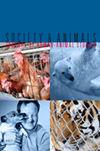How to Chase a Monkey: Reforming the Oiharai Response to Crop-Feeding Macaques in Japan
IF 1
4区 农林科学
Q4 SOCIOLOGY
引用次数: 0
Abstract
This research is about the reform of the farmer’s chase response to crop-damaging monkeys in Japan. It focuses on a campaign to transform this chase response, known as oiharai, from a simple field-side act of expulsion into a collective, extended, and high-threat (but non-lethal) pursuit aimed at deterring future monkey visits. A number of problems with the reform are identified, including, most fundamentally, a shortage of residents in today’s depopulated, ageing villages able to do the chasing. In order to overcome this obstacle, attempts are made to boost this depleted chase capacity using (human and nonhuman) surrogate chasers.如何追逐猴子:改革日本Oiharai对饲养猕猴的反应
本研究是关于日本农民对破坏作物的猴子的追赶反应的改革。它的重点是开展一项运动,将这种被称为oiharai的追逐反应从简单的野外驱逐行为转变为旨在阻止猴子未来来访的集体、广泛和高威胁(但非致命)的追捕。改革中出现了许多问题,其中最根本的问题是,在如今人口减少、老龄化的村庄,有能力追赶的居民短缺。为了克服这一障碍,人们尝试使用(人类和非人类)替代追逐者来提高这种耗尽的追逐能力。
本文章由计算机程序翻译,如有差异,请以英文原文为准。
求助全文
约1分钟内获得全文
求助全文
来源期刊

Society & Animals
社会科学-兽医学
CiteScore
1.40
自引率
12.50%
发文量
46
审稿时长
>12 weeks
期刊介绍:
Society & Animals publishes studies that describe and analyze our experiences of non-human animals from the perspective of various disciplines within both the Social Sciences (e.g., psychology, sociology, anthropology, political science) and the Humanities (e.g., history, literary criticism).
The journal specifically deals with subjects such as human-animal interactions in various settings (animal cruelty, the therapeutic uses of animals), the applied uses of animals (research, education, medicine and agriculture), the use of animals in popular culture (e.g. dog-fighting, circus, animal companion, animal research), attitudes toward animals as affected by different socializing agencies and strategies, representations of animals in literature, the history of the domestication of animals, the politics of animal welfare, and the constitution of the animal rights movement.
 求助内容:
求助内容: 应助结果提醒方式:
应助结果提醒方式:


